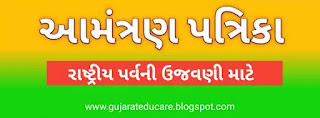Download Amantran Patrika Pdf and Excel File for 15th August and 26th January
 |
| Amantran Patrika |
A BLOG ABOUT UNIT TEST PAPERS, STUDY MATERIALS, LATEST CIRCULARS
 |
| Amantran Patrika |
In Australia, the headteacher is sometimes in charge of one (in the case of a major subject) or multiple (often in smaller schools) specific departments, such as English, history, maths, science, writing, technology, etc., but maintains full teaching duties and status. They are considered part of the school executive, and often a headteacher position is a stepping-stone into administration.
In larger schools, the principal is assisted by one or more "vice-principals", "assistant principals", "associate principals", or "deputy principals". Their position is secondary to the principal with regard to school governance. Assistant principals generally perform specific duties such as handling student discipline, curriculum, student council or student activities whereas the principal has the ultimate responsibility for the school as a whole (including faculty and staff, physical plant, etc.).
While there has been considerable anecdotal discussion about the importance of school principals, there has been very little systematic research into their impact on student outcomes. Recent analysis in the United States has examined how the gains in student achievement at a school change after the principal changes.
This outcome-based approach to measuring the effectiveness of principals is very similar to the value-added modeling that has been applied to the evaluation of teachers. Such research in the state of Texas found that principals have a very large impact on student achievement.
Effective school principals have been shown to significantly improve the performance of all students at the school, at least in part through their impacts on the selection and retention of good teachers. Ineffective principals have a similarly large negative effect on school performance, suggesting that issues of evaluation are as important for school administrators as they are for teachers.
The impact of principals has also been measured in non-traditional ways. Some principals have focused their efforts on creating more inclusive schools for students with disabilities.
IMPORTANT LINK:
આચાર્ય ચાર્જ બાબત કચ્છ જિલ્લાનો લેટર (10/01/2022)
આચાર્ય ચાર્જ સોંપણી પત્રક Excel
સિનિયોરિટી મુજબ આચાર્યનો ચાર્જ સોપવા બાબત 28/07/2023
Download Hajar Report and Chhuta Thavana Report in PDF & EXCEL File
A job, job, job or occupation, is the role of a person in society. More specifically, a job is an activity, often regular and often done in exchange for pay.
Many people have multiple jobs (for example, parent, homemaker, and clerk). A person can start a job by becoming an employee, volunteering, starting a business, or becoming a parent. The duration of a job can range from temporary to lifetime.
An activity that requires physical or mental effort from a person is work. If a person is qualified for a certain type of job, they may have a profession. Typically, a job would be a subset of someone's career. The two may differ in that one generally retires from their career, rather than resigning or laying off a job.
બદલી કેમ્પ ઓર્ડર ડાઉનલોડ કરો.
Most people spend up to forty or more hours a week in paid employment. Some exceptions are children, retirees, and people with disabilities; however, within these groups, many will work part-time, volunteer, or work as a homemaker. From the age of 5, the main role of many children in society is to learn and study as students.
Types of works
Jobs can be classified, by hours per week, full time or part time. They can be classified as temporary, occasional, seasonal, self-employment, consulting or contract jobs.
Jobs can be classified as paid or unpaid. Examples of unpaid jobs include volunteer, homemaker, mentor, student, and sometimes an intern.
Jobs can be classified according to the level of experience required: entry level, intern, and cooperative.
Some jobs require specific training or an academic degree.
Those without full-time paid employment can be classified as unemployed or underemployed if they seek full-time paid work.
A side job, also called side job, side job, or moonlighting, is additional work or jobs to supplement income. A person with a secondary job may have little time for sleep or leisure activities.
The UK Office for National Statistics lists 27,966 different job titles, on a website published in 2015.
The expression day job is often used for a job where one works to make ends meet while doing low-paying work in their preferred calling. Archetypal examples of this are the actor who works as a waiter while looking for roles and the professional athlete who works as a pawn in the offseason because the athlete's professional or semi-professional team does not pay for a full life. The term also applies to those who maintain a stable occupation while working as day traders.
While many people have a full-time occupation, "day work" specifically refers to those who occupy the position solely to pay for living expenses so that they can seek, through a low-income job, the job that they actually do. wish. The phrase strongly implies that daily work would be left, if only the true vocation paid a decent wage.
The phrase "don't quit your day job" is a humorous response to poor or mediocre performance that does not meet professional standards. The phrase implies that the interpreter is not talented enough in that activity to be able to make a career with it.
IMPORTANT LINKS:

Copyright (c) 2025 Gujarat Educare All Right Reseved